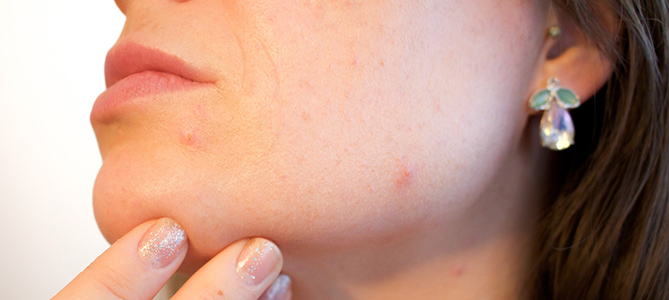
Herbalist and Naturopath Maya Daghighi lectures at CNM (College of Naturopathic Medicine).
Our skin is more than just a shell. It is a direct reflection of our inner organs. This is the very reason why therapies such as reflexology, even though applied on the skin, can positively influence the inner organs. Any faults inside our body will, vice versa, be reflected by our skin.
In a condition like acne a number of internal factors can be present, such as hormonal imbalances, faults in digestion, chronic infections and suppressed immunity. Acne also often comes along with clogged up lymphatic channels, the body’s waste disposal system. However, it’s equally dependent on age, lifestyle and diet. Hence a one-size-fits-all solution, such as antibiotics or the contraceptive pill, is just not possible. Luckily there are numerous ways to help with this condition naturally.
It’s vitally important that you’re in charge of your daily skincare. Many anti-spot skincare products can be particularly aggressive, damaging your skin in the long term. Choose natural skincare where you can. Marigold cream, also known as Calendula, can be very useful due to its anti-microbial, toning and healing properties. You can add a few drops of Lavender essential oil to your cream jar and this can help soothe inflamed acne topically. Your herbalist can create an even more potent and individualised ointment or lotion. Some find a toner made from Echinacea and Chamomile tea effective. Ginger essential oil (diluted in a few drops of sesame oil) applied on deep seated painful spots can help to resolve them more quickly.
Clean up your diet!
As with almost all skin conditions, gut health is vital. If you have any health issues, then make sure you are
addressing them. But as general advice: reduce dairy and gluten in your diet, cut out refined sugars, trans fats and processed foods; use garlic, onions, parsley, green superfoods, and top up on your veggies in your daily meals. Go organic to reduce toxic residues in your system.
Some kitchen herbs and spices support digestion and have anti-microbial properties. These include fennel seeds, cumin, cinnamon, cloves, thyme, and rosemary. Use them in your diet as you feel suits you. Along the same lines and vital to your digestion, are bitter foods or herbal bitters, such as Swedish bitters. Also turmeric and milk thistle can help acne through their action on detoxification pathways in the liver.
Blood sugar balance is vital. Did you know that you can use cinnamon or liquorice root as a sweetener?
Alternatively stick to healthy sugar alternatives such as raw honey, stevia or maple syrup.
Have you ever considered a detox? Unhealthy or unsuitable foods for you can overload the body with toxins, impacting on its eliminative function (skin is a major organ of elimination). Cleaning up your daily diet will be the first step, but a detoxification programme can be recommended by your practitioner.
Build up your immunity and find ways to relax!

Exercise regularly and manage your stress to keep your hormones balanced. Siberian ginseng is the best herb to support you with your daily challenges. When you are stressed your adrenal glands release hormones, putting pressure on your system. This will imbalance your hormones even more and might worsen any condition, including acne.
Echinacea can be very effective in building up your immunity and there have been a number of reports on how it can improve conditions such as acne. Finally, a daily tea of cleavers, nettle and marigold helps to keep your blood and lymph clear.
Don’t forget, in more serious acne cases or if there are other conditions present, consult with your Herbalist before taking or applying herbs. Personalised advice is always best. A Herbalist who has also trained as a Naturopath is additionally qualified to provide dietary and lifestyle advice.
CNM’s Herbal Medicine Diploma Course which is taught in Dublin, London and Manchester, is based on Western herbs but it also incorporates the energetic approach of Ayurvedic and Chinese Medicine. Students also gain a good grounding in Naturopathy, Naturopathic Nutrition, First-aid Homeopathy, Chinese diagnostics, Bach Flowers, Tissue Salts, and Iridology, and learn to apply other therapeutic and assessment tools which can enhance the results for clients. Naturopaths aim to identify and address the root cause of the problem rather than just isolated symptoms, and take the healing powers of nature as inspiration.
In an age when mainstream medicine has become complex and ever more technical, herbal medicine can offer a simple, natural and holistic way to support the body’s innate drive to heal itself.
 Herbalist and Naturopath Maya Daghighi lectures at CNM (College of Naturopathic Medicine).
Herbalist and Naturopath Maya Daghighi lectures at CNM (College of Naturopathic Medicine).
You can train at CNM in London or Manchester for a Diploma in Herbal Medicine or complete a Short Course in Herbs For Everyday Living in London.



